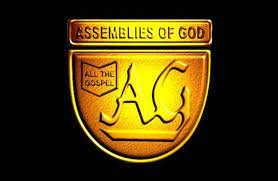AG Sunday School Manual Adult Teacher 18th August 2024 – Isaac Blesses Jacob. Get all Assmblies of God Sunday School Manual here
ASSEMBLIES OF GOD NIGERIA ADULT SUNDAY SCHOOL LESSONS|JULY-DECEMBER, 2024.
UNIT 2: Early Israelites History
DATE: August 18, 2024 LESSON 7
TOPIC: ISAAC BLESSES JACOB
MEMORY VERSE GENESIS 25:23
The Lord said unto [Rebekah), Two nations are in thy womb, and two manner of people shall be separated from thy bowels, and the one people shall be stronger than the other people; and the elder shall serve the younger (KJV).
CENTRAL TRUTH
God’s plan for humanity will be fully realized despite the sinfulness of people.
THE LESSON OUTLINE:
1. Plot to Deceive Isaac
A. Isaac Plans to Bless Esau Genesis 27:1-4
B. Rebekah Plots for Jacob Genesis 27:5-13
2. Isaac Deceived; Jacob Blessed
A. Jacob’s Deception ls Effective Genesis 27:14-24
B. Isaac Blesses Jacob Genesis 27:25-29
3. A Deceiver Revealed
A. Esau Receives an “Anti-blessing” Genesis 27:30-40
B. Jacob Must Flee from Esau Genesis 27:41-46
_______________
LEARNING OBJECTIVES
At the end of this lesson, students will be able to:
1. Examine the account of Jacob stealing Esau’s blessing through deceit.
2. Recognise God’s plans prevail despite human failures.
3. Search their hearts to ensure they are not allowing or rationalising deception in their lives.
_______________
Introducing the Lesson
As we read through the narratives of the Old Testament, it can be difficult to view the characters as everyday human beings with the same kinds of emotions, passions, and flaws we struggle with. But when we come to the story of Isaac’s two sons, human frailty takes center stage.
_______________
The Holy Scriptures
Genesis 27:2. And he said, Behold now, I am old, I know not the day of my death:
3. Now therefore take, I pray thee, thy weapons, thy quiver and thy bow, and go out to the field, and take me some venison;
4. And make me savoury meat, such as I love, and bring it to me, that I may eat; that my soul may bless thee before I die.
5. And Rebekah heard when Isaac spake to Esau his son. And Esau went to the field to hunt for venison, and to bring it.
8. Now therefore, my son, obey my voice according to that which I command thee.
9. Go now to the flock, and fetch me from thence two good kids of the goats; and I will make them savoury meat for thy father, such as he loveth:
10. And thou shalt bring it to thy father, that he may eat, and that he may bless thee before his death.
14. And he went, and fetched, and brought them to his mother: and his mother made savoury meat, such as his father loved.
27. And he came near, and kissed him: and he smelled the smell of his raiment, and blessed him, and said, See, the smell of my son is as the smell of a field which the LORD hath blessed:
28. Therefore God give thee of the dew of heaven, and the fatness of the earth, and plenty of corn and wine:
29. Let people serve thee, and nations bow down to thee: be lord over thy brethren, and let thy mother's sons bow down to thee: cursed be every one that curseth thee, and blessed be he that blesseth thee.
32. And Isaac his father said unto him, Who art thou? And he said, I am thy son, thy firstborn Esau.
33. And Isaac trembled very exceedingly, and said, Who? where is he that hath taken venison, and brought it me, and I have eaten of all before thou camest, and have blessed him? yea, and he shall be blessed.
Sunday School Manual Adult Teacher 18th August 2024: COMMENTARY AND APPLICATION
1. Plot to Deceive lsaac
A. Isaac Plans to Bless Esau Genesis 27:1-4
Genesis 27 must be viewed in light of 25:19-34. God had blessed Isaac and Rebekah with twins, and He revealed to Rebekah that the elder would serve the younger (25:23). God’s plan diverged from the most basic cultural norms of that time. The elder son received the inheritance and held the favoured position in the family.
Yet throughout Genesis, God fulfilled His plan in ways that ran counter to society’s expectations. The descendants of Adam and Eve’s third son, Seth, would be chosen as God’s people (chapters 4-5). lsaac was chosen over his older brother, Ishmael (17:18-19). Joseph and Judah were both chosen over their older brothers (37:3; 49:8). Even Rachel was chosen over her older sister, Leah (29: 16-18). The message is clear: God’s favour is not based on natural rights but His sovereign and eternal purposes.
In Genesis 27:1-4, Isaac was near death. Nearly blind, he called for his elder son, Esau, to receive the fatherly blessing–his birthright- after preparing Isaac’s favourite meal. The birthright included a double portion of the inheritance and signified a position of honour in the family.
Although it was reserved for the eldest son, it could be transferred. In fact, just such a transfer had happened when Esau foolishly traded his birthright to Jacob in exchange for a meal (25:29-34). Scripture makes it clear that Esau “showed contempt for his rights as the firstborn” (verse 34, NLT) and God intended for Jacob to receive those rights (verse 23). Yet Isaac still determined to give the birthright to Esau, his favourite son.
Questions For Application
What are some reasons God may have chosen to bring about His plans through unexpected means?
Describe a time when God’s plans surprised you. What caused you to be surprised? What did you learn from the experience?
_______________
B. Rebekah Plots for Jacob
Genesis 27:5-13
Genesis 27 is certainly not the Israelites’ finest hour. We know this was the family through whom all the world would be blessed, but their divisions were deep. In verses 5-6, Isaac spoke to “his son” Esau, while Rebekah spoke to “her son” Jacob. Rebekah had overheard Isaac’s plan to bless Esau, and she quickly acted to exploit her husband’s blindness and frailty. She planned for Jacob to receive the birthright before Isaac even knew what had happened (verses 7-10).
Rebekah may have been distressed by Isaac’s plan to grant Esau the birthright without Jacob present. This demonstrated a clear lack of respect for the process, since both sons would receive a portion of their father’s blessing. Yet Rebekah’s ruse was more destructive than any oversight, intentional though it may have been.
Knowing her husband could become suspicious, Rebekah plotted for Jacob to play the part of Esau convincingly. Two goat hides and a delicious meal would give Isaac all the sensory evidence he needed to hand the birthright to his younger son. Jacob had concerns about the plan, and his mother had placed him in a difficult position (verses 11-12).
Should he honour his mother’s command or his father’s will? In the end, his greatest concern was that his father would curse him, passing down a public reprimand or word of contempt that would follow him and result in misfortune or even death. Rebekah responded to Jacob’s concerns in a way that might seem startling at first, calling the curse to fall upon herself.
It was a grievous wrong to deceive a blind, dying man in this way, much less one’s father and husband. Rebekah knew the plan of God and recognised Jacob should receive the birthright, but she brought about God’s will using ungodly tactics. She is scarcely mentioned after Genesis 27, and her death is not even recorded (though her nurse Deborah’s death is recorded in 35:8). In the end, this was another example of the way God honours His promise despite the behaviour of His chosen people.
_______________
Questions For Application
What are some ways Christians might be tempted to “take matters into their own hands” when they feel God’s plans are threatened?
How do you respond when your circumstances seem to be at odds with God’s plans? What are some right and wrong responses?
_______________
2. Isaac Deceived; Jacob.Blessed
A. Jacob’s Deception Is Effective
Genesis 27:14-24
Jacob did as his mother directed, killing two young goats. After Rebekah prepared the meal, she dressed her younger son in Esau’s clothes, then covered his arms and neck in the skin of the goats. This would leave Jacob’s skin feeling like that of Esau, who was a rugged, hairy man, in contrast to the fairer Jacob. Finally, Rebekah gave Jacob the food and sent him to his father (verses 14-18).
Jacob quickly identified himself as Esau to his father, emphasising he was Isaac’s “firstborn son Jacob’s lie grew in response to his father’s question: How could it be
Esau had finished his hunting so quickly? Jacob answered, “The Lord your God put it in my path!” (verse 20, NLT). Now Jacob was not only
deceiving his father but also adding blasphemy to his offences by using the name of the Lord in vain, using the Name for wrong purposes. It is also noteworthy that Jacob referred to God as “the Lord your God.” Scholars note that Jacob did not refer to the Lord as being his God until after encountering Him in a dream during the journey to Haran (28:20-22), It was only after the promise is fulfilled in him that Jacob Worshipped the Lord.
Back in chapter 27, Isaac’s suspicion of the situation was palpable (verses 21-24). First, he asked to touch his son to confirm that he was, in fact, Esau. He also noticed his son’s voice did not sound like Esau’s voice. But lsaac ignored these clues.
After all, his son’s hands felt like Esau’s hands. He asked one more time: “Are you really my son Esau?” And Jacob answered, “Yes, I am” (verse 24, NLT). Sadly, this powerful moment of promise and blessing was polluted by Jacob and Rebekah’s deception.
_______________
Questions For Application
Sometimes even Christians are tempted to believe “the end justifies the means.” How can we know when we have crossed that line?
Why is it dangerous to compromise in order to bring about “right” results?
_______________
B. Isaac Blesses Jaco Genesis 27:25-29
In Genesis 27: 25, Isaac- having been persuaded that Jacob was Esau- asked to enjoy a celebratory meal with his son. After partaking of the food and wine Jacob gave him, Isaac asked “Esau” to come closer and kiss him. This paternal kiss was not merely a sign of affection but constituted an important part of the ritual. Intended to demonstrate loyalty, it makes the Scene even more sadly ironic.
Isaac smelled “the outdoors” on Jacob as he leaned closer (verse 27, NLT), since his son was covered in goat skins. The smell and the feel of the fur on Jacob’s arms convinced Isaac he was speaking with Esau.
Although lsaac understood the value of the birthright blessing, he took surprisingly little care to ensure it was delivered properly. As a result, he blessed Jacob (verses 28-29).
This blessing from father to son was much more than a formality. It was not a wish, hope, or prayer; it had legal force. Because this family had been chosen by God to bring about His covenant, Isaac’s blessing would be prophetic and spoken with God-given authority. Give special attention to the words of this blessing.
It refers to all God had Conferred up on Abraham: prosperity, dominion, protection, and the promise to bless all the nations of the Earth through him and his descendants. This blessing was bestowed upon Jacob despite his deception. God’s plan would move forward, even through flawed, fallen people.
_______________
Questions For Application
Some Christians believe failures disqualify them from taking part in God’s plan for the world. How can Isaac and Jacob’s story give them hope?
What would you say to a Christian who is overwhelmed with discouragement over past failures?
_______________
3. A Deceiver Revealed
A. Esau Receives an “Anti-blessing” Genesis 27:30-40
Mere moments after Jacob had received the blessing and departed from his father, Esau, who had returned from the hunt, brought the food he prepared and announced: “Sit up, my father, and eat my wild game So you can give me your blessing” (Genesis 27:31, NLT). Isaac responded: “Who are you?” (verse 32, NLT).
A short time earlier, he had shrugged off his concerns when Jacob did not sound like Esau during the critical moments of the blessing, and now he fell into utter confusion at the sound of Esau’s voice.
One can sense Isaac’s deep emotion after Esau identified himself. A beautiful family event had turned tragic. Yet in that chaotic, emotional moment when Isaac “began to tremble uncontrollably,” he demonstrated a mental clarity he had not shown with Jacob: “I blessed him just before you came.
And yes, that blessing must stand!” (verse 33, NLT). Isaac knew God’s will had been accomplished, although his own plans were dashed. Isaac may have had the wrong son in view, but he spoke the blessing of the firstborn over Jacob, and it carried the full force of a vow spoken before the Lord.
Esau was devastated. Verses 34-36 reveal a range of emotions: bitterness, false hope, fury, and desperation. Yet the reality is, he had despised his own birthright and given it to Jacob in the first place Isaac responded to Esau’s outburst with blunt truth: Jacob had received all the blessing entailed, including his descendants’ dominance over Esau’s line. Nothing remained to be given. Yet Esau continue to plead and weep.
Finally, Isaac answered. But his words to Esau were far from a blessing. In fact, some scholars refer to them as an “anti-blessing” that would follow Esau’s lineage for many generations, even centuries. To understand its meaning, we need to look back at Jacob’s blessing and Abraham’s covenant promise.
Jacob’s line would enjoy prosperity, but Esau’s line would “live away from the richness of the earth” (verse 39, NLT). This would be the land of Edom (see 32:3; 36:1-9). Located southeast of the Dead Sea, the region of Edom is a dry, desert wilderness bearing little resemblance to the lush, fruitful areas covering much of Israel.
Furthermore, while the whole Earth would be blessed through Jacob’s seed, Esau’s descendants would be known as people of conflict and war. This reality is demonstrated throughout the Old Testament, particularly in their acrimonious relationship with Israel (see 1 Samuel 14:47; 2 Kings 14:7-10; Psalm 60:9-12).
From the time of David, Edom was part of Israel’s empire; thus, “serving Jacob” (see 2 Samuel 8:11-14). However, as Isaac had stated, Edom would break free from Israel (2 Kings 8:20-22). After Jerusalem fell to the Babylonians (in 586 BC), Edom took a measure of revenge against Israel (Psalm 137:7; Obadiah 10-14).
_______________
Questions For Application
What is your assessment of what happened to Esau? What can we learn from his life?
What are some long-term effects of family conflict?
_______________
B. Jacob Must Flee from Esau Genesis 27:41-46
Esau immediately began
devising a plan to murder Jacob once their father was dead. Jacob was forced to flee and live with his uncle Laban. This was a welcome development for Rebekah, who was concerned about Jacob finding a suitable wife (Genesis 27:46) among the Hittites, a people group who were not under the covenant. While part of Laban’s household, Jacob would marry Leah, who would give birth to Judah and continue the lineage to Christ and the ultimate fulfilment of the covenant. Indeed, God’s wonderful promise continued to be kept, step by step, even amid turmoil and strife.
_______________
Questions For Application
Describe a time when conflict led to something good in your life.
_______________
Call to Discipleship
Although Jacob and Esau experienced much more turmoil in the Coming years, they were reconciled in Genesis 33. By God’s grace and power, even the most dysfunctional family situations can be resolved.
_______________
Ministry in Action
Make an effort this week (as far as you are able) to reconcile with someone whose relationship with you is strained.
Pray with one another at the end of class, asking God to encourage those plagued by memories of past sins or grieved because of a broken relationship.
Seek accountability with a trusted believer to help you resist any temptation to act dishonestly or unethically, no matter how justifiable the situation might seem.
Incase you missed last Sunday Lesson: AG Sunday School Manual Adult Teacher 11th August 2024 – God’ Covenant with Abraham



